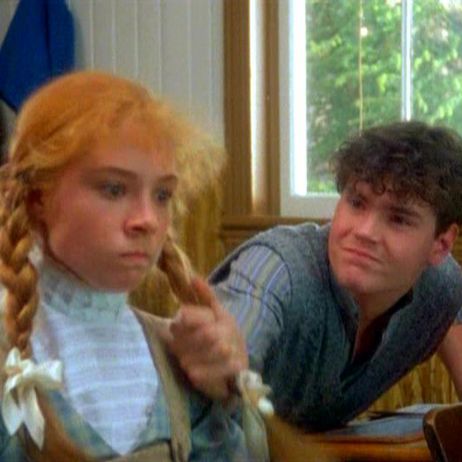|
Word Gems
exploring self-realization, sacred personhood, and full humanity
Editor's Essay: Part II
Will You Survive the Terror of Eternal Life?
return to "Eternity and Infinity" main-page
|
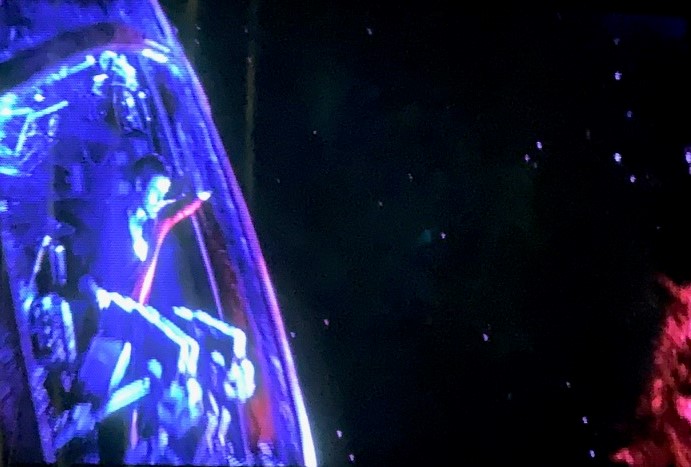
Avengers: Endgame (2019)
Ironman: "the existential terror of staring into the void of space"
|
|
Editor's prefatory note:
Part I of this writing was meant to be a singularity. However, I’ve come to see that this entire subject is so important that a little more discussion is warranted. Certain elements providing beginning answer to “Surviving the Terror,” while addressed in Part I, were emphasized too much, with some, not enough.
Proportion is important. As well expressed by Dorothy Sayers, "The proportion and relations of things are just as much facts as the things themselves; and if you get those wrong, you falsify the picture really seriously."
|
Barclay was right – only 'the gods' know how to live forever, and if we try this without ratcheting up our pay-grade, we’ll make a hash of it
For those who disagree, I’ll just reference a line from an old song: “alotta men didn’t and alotta men died.” The fact of the matter is, most – yes, most – of the people on the other side suffer, to one degree or another, in various forms of insanity.
They might be smiling, and they might talk about high-minded things, but, as the ancient Chinese man instructed us, they’re existential accidents waiting to happen, are consumed by a systemic sense of emptiness, egoic feelings of “I am not enough.” They experience no true happiness over there. Read about this mayhem in the article, “500 tape-recorded messages from the other side.”

'the dead ones'
In her lectures on the Iliad, Professor Elizabeth Vandiver informs us that human mortality is the crucial distinction between human beings and the very anthropomorphic Olympian gods. From the Greek text, we see that the gods are “the athanatoi,” or “deathless ones.” They cannot die. Humans, however, are “the thnetoi,” that is “the dying” or “dead ones.” They must die.
Mortality, the annoying requirement of needing to die, according to Greek thinking, is the quintessential characteristic of the human condition. It’s how we identify these creatures.
Dr. Barclay, as we’ve seen, tells us that the familiar New Testament Greek word for “eternal” has a long history. It means, essentially, “living on the level of the gods.” The point is this:
Just because humans might be granted a post-mortem survival of consciousness doesn’t mean that they’ll automatically know how to use this gift. What we discover is that, when people cross over, generally speaking, they take all of their “earthbound” ideas with them. They try to live as mortals in an immortal environment. They hit the glass ceiling; they continue to live and act as if they're limited, needy, and “not enough.”
And this great misperception not only makes them unhappy but mentally unbalanced; and, as more time goes on, the more off-kilter they become. It happens slowly. It's like the old story of the frog slowly boiling in water. The transformation happens so imperceptibly, the frog gets taken over before it knows anything's different. So too with the unenlightened ones on the other side - they become the insane ones, the walking "dead ones," even in Summerland. Read more about this in "the 500" article.
in Part I of this writing, I spent much time emphasizing the need to find one’s 'true self'
And, of course, this needs to be the starting point. What good are we to ourselves, to full-bodied living, if we're dead and blind, if our radar hasn't been installed yet?
Accessing the “true self” is the beginning of awareness, of one’s authentic life. It is a realization of one's connection to Divinity itself, to Universal Consciousness.
And so, once we have this, pray tell, what further need have we of anything? We’ve come alive. Our eyes are now open. We’ve achieved, we've arrived, we have one foot over the line into authentic awareness.
does the story end here
There was a time when I thought that this is how the story ends, in terms of our spiritual evolvement. The problem is, as I've learned, there are people who have experienced “the true self,” the inner life, and even the extremely important “gap,” which we discussed in the “surrender” essay; even so, they languish in a form of narrow-minded darkness; half-dead, half-alive.
I once thought that finding "the true self" should mean the last word; and it is very important – but – though every one of the aforementioned people has caught a glimpse of “the inner riches,” each remains a totalitarian; not all the time, and not obviously, but every once in while they give themselves away by saying something that reveals an attitude of "I am better," and “I thank thee Lord that I am not like other men.”
Understanding and witnessing this gross anomaly became, for me, one of the most instructive lessons of my life. I'm reminded of the parables of Jesus wherein he speaks of those who begin well, but then stumble and fall down, as they fail to follow through.
Over the years, as I've discussed the concept of "the true self" and entering awareness, I'd sometimes posed the question, more to myself than to the reader: "Ok, becoming more conscious is very important, but exactly what are we to become conscious of?" Well, everything, really, but there is a focus, and I finally know the answer to this.
Elsewhere, I'd posted the following inset-box:
|
the most important concept on the Word Gems site
At the time of this writing, the Word Gems site conceals 2000 documents; if printed, 10,000 pages might ensue.
I no longer feel the need to add anything to this corpus of information. Especially, with this final chapter of the "small room" book, I ask myself: if required to choose one most important concept from the many gold-nuggets I’ve been privileged to see, what would it be?
It’s is the “mind the gap” principle - introduced in the “Surrender and Acceptance” page, and further discussed in the “Zen” article, along with the “Just Sitting” writing.
“Mind the gap” means that one perceives the great existential separation between “true self” and “false self.” It allows one to say, “I am here, the real me, reveling in a quietude of peace, and over there, across the divide, is the emotional chaos which, for so long, has been masquerading as my essential self but, in fact, is an imposter.”
I feel there is no more important precept that one might possess to prepare one’s spirit for life in the next dimensions. Why is this? It is so because “mind the gap” means that you’ve not only accessed, but have crossed over the threshold into, the domain of the sacred soul.
In that celestial realm of certainty, wherein one is linked to Universal Consciousness, all mysteries will yet bow the neck and bend the knee to one’s investigations. In time, the hidden regularities of the universe will disgorge themselves as you come to understand more and more and more… and not even some of those on the other side for thousands of years, who have not yet perceived the efficacy of “mind the gap,” will be able to stand against you.
Some may ask, shouldn’t love have something to do with a “most important concept”? And I would say, yes, of course, as mystics, poets, and saints instruct of its highest expression of the human spirit. However, unless we access the “true self,” we will never experience authentic love, but only its ersatz counterpart, mere egoic wanting and needing. When we do find ourselves in this way, true love, a perception of oneness, automatically and naturally rises to the surface of consciousness. It was there all the time, in the silent reaches of the soul, inaccessible however, due to “static on the line” from the “false self.”
Editor’s note: Recently, I've come to view all of the above as "second most important." See on the "ultimate reality" page.
|
I had billed the inset-box above as “the most important concept.” I think I may have oversold this superlative. While the box's concluding “Editor’s note” mitigates somewhat, I still feel that “most important” is misleading. It’s accurate in the sense of necessary first step; in other words, we can’t get to where we really want to go without first things first, such as “minding the gap.” However, Sayers is right, proportion is important, and if you get that wrong, “you falsify the picture really seriously."
What’s missing here?
“Minding the gap” starts the process of becoming a sane individual. Our eyes begin to open. We become conscious in an elevated way. But, without more, eventually, we’ll feel like we’re living in hell. We're made to become conscious of a particular something.
The answer is not complicated. We’ve discussed this in a hundred writings. It is the primacy of true love in one’s life. Viktor Frankl, in his concentration-camp visions, exclaimed,
Man's Search for Meaning: Recounting an Auschwitz experience: "We stumbled on in the darkness, over big stones and through large puddles, along the one road running through the camp. The accompanying guards kept shouting at us and driving us with the butts of their rifles... But my mind clung to my wife's image, imagining it with an uncanny acuteness. I heard her answering me, saw her smile, her frank and encouraging look... for the first time in my life I saw the truth as it is set into song by so many poets, proclaimed as the final wisdom by so many thinkers. The truth - that love is the ultimate and the highest goal to which man can aspire. Then I grasped the meaning of the greatest secret that human poetry and human thought and belief have to impart: The salvation of man is through love and in love. I understood how a man who has nothing left in this world may still know bliss, be it only for a brief moment, in the contemplation of his beloved. In a position of utter desolation, when a man cannot express himself in positive action, when his only achievement may consist in enduring his sufferings in the right way - an honorable way - in such a position man can, through loving contemplation of the image he carries of his beloved, achieve fulfillment... I resumed talk with my loved one: I asked her questions, and she answered; she questioned me in return, and I answered."
the sparkling diamond on the black velvet cloth
I noticed that Frankl came to this insight while enduring the darkness of great atrocity. I now realize that this juxtapositioning of light and dark was not accidental but part of the process of his perspicacity: a diamond sparkles most brilliantly against a backdrop of black cloth.
This doesn’t mean that we need to be brutalized in order to see more clearly. (We discussed this in the “Prometheus” book.) There's a bloodless -- but not necessarily less horrific -- way of accomplishing the same.
Authentic spirituality does not spring from a regimen of trying very hard to do good works, of thinking good thoughts, of huffing-and-puffing to live a good life. (See the four articles on “spirituality.”)
All these good qualities are fine and to be valued, but all these, properly crafted, will be the result of true spirituality, not the origin.
What is needed is a ratcheting-up of one’s level of consciousness – even beyond that of “minding the gap.” What is needed is the contrasting “black velvet cloth” backdrop, a clear perception of one’s own inner darkness, the dysfunctional grasping “Little Me Ego.”
With this malady coming into view, we are now ready to perceive and to appreciate the sparkling diamond of the “inner riches,” the true self.
|
Dr. Carl Jung: “Knowing your own darkness is the best method for dealing with the darkness of other people. One does not become enlightened by imagining figures of light, but by making the darkness conscious. The most terrifying thing is to accept oneself completely. Your visions will become clear only when you can look into your own heart. Who looks outside, dreams; who looks inside, awakes.”
Editor's note: "Opening a channel" allows us to see where we've gone wrong. Jung, in his own words, expresses Jesus' teaching of "first remove the beam in your own eye, and then you will see clearly to remove the speck in your brother's eye." Knowing your own darkness is the beginning of authentic spirituality.
|
how this “Part II” article came to be
It’s not necessary, nor desirable, to live in constant vision of the inner darkness. An occasional trip there is enough. It’s a mystical encounter, a journey into the “madness maddened.” It’s our cure for “I thank thee Lord that I am not like other men.”
I can think of two or three times in the last ten years when this horror has overtaken me. It’s a cleansing process, actually. I don’t like going there very often, and it’s not something you can really control, but when the higher self takes you there, let’s just say, it’s educational.
Late one night, I was very tired, but I’d been thinking about this issue of “surviving the terror of eternal life.” Well, I’m the one who’s supposed to know something about these things, with the years of research and all. And I do know about, more than others, all the good things to come in Summerland. Yet, in that late hour, a dread began to overcome me. I saw myself in Summerland. I had my small farm, my animals, my university studies, my service projects, and my closest relatives around, plus good friends – all things that make for a good life. But, I perceived that all this was not enough to "survive eternal life."
And I thought of a typical day in Summerland – but, this in itself is a problem, in that, there are no separate “days,” as such, just one long unbroken summer day, there’s no division of daytime and nighttime. This began to bother me, with an inadvertent feeling of, “How can I escape myself with sleep if there’s no end to the day, if it just goes on and on? - and you can't die, you can't get away from it! How do you survive that?"
This discomfiture, like falling into an infinite bottomless pit, began to grow in my mind. A certain panic set in. And I realized that a good life in Summerland, if not properly oriented, can be just as much an "existential terror" as being lost in space.
|

Avengers: Endgame (2019)
Ironman: "the existential terror of staring into the void of space"
|
And I clearly saw that pleasant setting, university studies, charitable works, friends, and pets could help only so much. At the end of the day – if there were such an end of day in Summerland -- one still needed to face oneself.
However, as I surveyed this “terror of eternal life,” I felt the warming answer rising from the depths. And I found myself understanding what Frankl saw in his revelations 90 years ago. Our true salvation is by love, through love, and in love. With this, a sense of fullness supported my weariness.
And I saw, more clearly than before – though I've written books on this subject – that without the love of a Sacred Beloved no one will survive the terror of eternal life.
In this we speak with Shakespeare’s Juliet to her absent beloved: “So dear I love him that, with him, all deaths I could endure. Without him, live no life.” This includes eternal life.
The kind of romantic love to which we refer here is not John-and-Mary love. We need an elevated form allowing us to "live as the gods."
Rainer Maria Rilke: “It is part of the nature of every definitive love that sooner or later it can reach the beloved only in infinity.”
|
I don't have anything, since I don't have you

Since I Don't Have You
|
I don't have plans and schemes
I don't have hopes and dreams
I don't have anything
since I don't have you
I don't have fond desires
I don't have happy hours
I don't have anything
since I don't have you...
|
READ MORE
|
|
What would it be like having an endless perfect summer day, with no day-and-night?
an excerpt from Krishnamurti's lecture, March 12, 1968:
"So thought creates fear of tomorrow, tomorrow being death. Actually if you observe, there is no tomorrow at all; if you really faced that fact psychologically you would no doubt be terribly afraid because tomorrow matters very much - psychologically. Tomorrow is going to give you a great deal of pleasure, you are going to paint a better picture or compose with greater feeling, you'll make it up with your wife or husband. So for you tomorrow is extraordinarily important. And is there tomorrow psychologically or has thought invented it? And if there is no fear, there is no tomorrow; then one lives with that complete sense of wholeness, always in the present."
Editor's note: This is another profound concept by K. What does it mean “there is no tomorrow at all”? Some years ago now, when I first learned of Summerland, I found myself uneasy with the prospect of the endless perfect summer day; there is no day-and-night there (however, you can go to areas to experience what you like, including, not just eventide but, rain, snow, etc.). This concept of unending day and “no tomorrow” still bothers me at times.
But why should this be so? As I examine my subliminal fear associated with this I begin to see. “Tomorrow,” apart from the ready definition of future duration of time, as K points out, is actually a psychological construct. The ego, ever judging itself to be needy, sees the future as refuge, a place of salvation, as it wants more time to enhance itself: “I might not have it all together right now, but my ship will come in – tomorrow.”
What a great insight by K! If we learn to become present to the “inner riches” and therefore live in the present moment, a sense of “tomorrow” disappears. In order to properly deal with the “terror of living forever,” we must learn to “live as the gods.” The gods don't live in tomorrow but an eternal present. And simply importing one’s old mortal mindset into Summerland is not going to cut it for us.
|
|
'the disease of immortality'
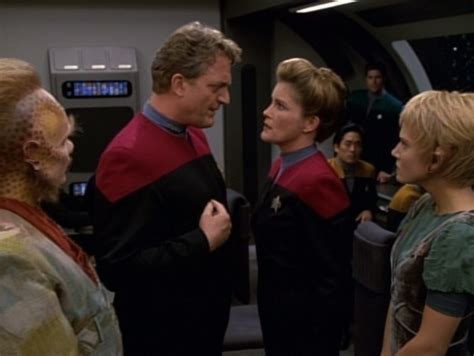
Star Trek: Voyager, season 2, episode “Death Wish” (1996)
A member of the Q Continuum seeks asylum on Captain Janeway’s Voyager. The cause of action? We are well familiar with refugees from totalitarian states oppressing its citizens with violence and threats of death. However, we’ve not often encountered a regime which imposes immortality as violation of human rights.
This episode of Star Trek: Voyager offers profound discussion on a topic not often addressed: What would it be like to be required to live forever for one who had not learned how to access purpose from existence?
The Q member in question had been a philosopher among his people, had written a regularly published blog:
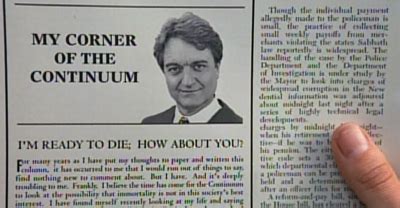
And for those who believe that altruistic service is the center of life’s meaning, we discover that this individual had spent hundreds of years offering important help to humanity. But, in the end, this, by itself, was not enough to make him want to remain alive. We’ve discussed the inefficacy of good works as ultimate purpose of living.
These issues are vitally important, and a day will come when Life itself will demand answers of us; such will present themselves by knowing who we are and why we were created.
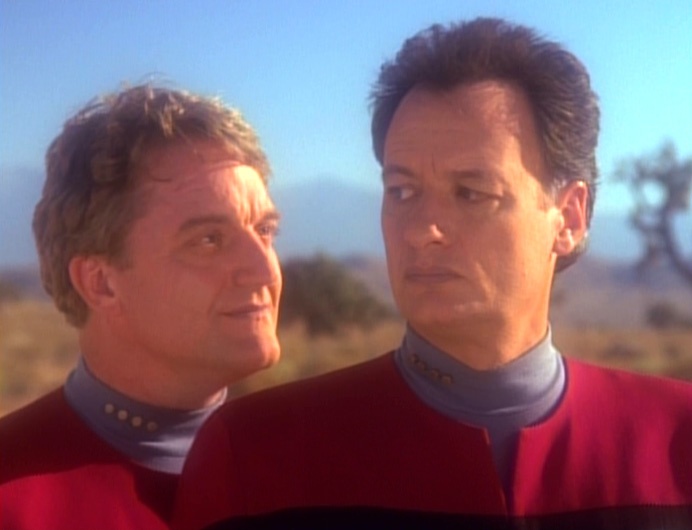
|
|
one more attempt at explaining the ineffable
I had finished this “Part II” article - once again, thought I was finished. However, I found myself bothered by a sense that I had not yet expressed the essential concept. Granted, the answer here, that which allows us to “survive eternal life,” is the mind and viewpoint of God. And how does one capture that marvel in mere words on a page?
Nevertheless, allow me to try, one more time.
In the Christian tradition, popularized by Dante, there is a precept, a view of the reward of the blessed, the “Beatific Vision.”
Suffice to say, the general idea asserted that the highest station to which mortals could attain would be to spend eternity gazing upon the glorious splendiferous face of The Most High God. For endless eons to come, so the teaching suggested, we would be mesmerized, held in thrall, by the radiant visage of The Eternal God.
The scientific evidence for the afterlife informs us that there is no “Great White Throne” on the other side, no “Sky God,” no grandfather figure with a long white beard. People over there do not see any visible indications of God; at least, none of popular religious conception. We have discussed this many times before. However, even though the “Beatific Vision” as portrayed by orthodoxy does not exist, I have come to understand that this teaching contains a very beautiful underlying truth.
In my studies of classical mythology, I’ve learned that, not infrequently, a mythical hero or god, stories of which have been passed down through the centuries, might bear a kernel of historical truth or wisdom-principle; for example, the legend of Theseus and the Minotaur. While no actual fantastic monster, half-bull and half-man, ever existed, archeological excavations of Knossos on Crete reveal a ritualistic historical involvement of early Minoan civilization with elements of the Theseus-Minotaur legend.
So, too, in my view, the “Beatific Vision” offers a core truth, brings to us a glimpse of the infinite empyreal. There were those in ancient times, as in all times, who've had psychic abilities and received images of the wonders of the next life. And some of these percipients, over the years, would have discerned the beautiful truth that the happiness of eternal life has something to do with basking in the “Beatific Vision” of God, an expression of Ultimate Beauty, that warms, comforts, and uplifts the soul.
One does not need to be a fully-developed psychic to know some of these things. I say this because I sense that these portals to highest reality are available to all of us, if we “open a channel.”
When an “open channel” of perception begins to uncloud the eyes, the eyes of the soul, we begin to see things, understand things. It will be a mystical revelation; but perhaps I should not use the term “mystical” because it sounds too abstract or religious, and that would give the wrong impression. The “open channel,” available to us all, produces a sense of joy, unparalleled in one’s life. And in receipt of this kind of “Beatific” joy, all fear and “terror of surviving eternity” melts away.
How can we encourage or facilitate this accessing of Ultimate Beauty? There is no sure formula to this "pathless land." The ancient Spirit Guides indicate that it will happen for each of us, in this world or the next, at the right time, the right time for one’s soul to awaken. But how will this occur? Are we to literally see the face of God? I think not, and a million or a billion years from now we shall still affirm this statement. Then how?
I think there’s a reason why ancient prophecies insist that the “image of God” is revealed to us in the form of female and male. I feel that the truth of this doctrine extends far beyond biological attraction. As the great spiritual teachers have preached, this ultimate sense of affinity will not work for just any two fish in the sea; instead, it means, one particular woman made for one particular man. Each, as is said, becomes a “messiah,” a “savior,” to the other; each to the other reveals the visage of the unknowable God; each, via the agency of “made in the image,” transmits a sense of the “Beatific Vision” of the utterly transcendent and glorious God.
|
channeled information from Summerland, as reported in Excursions to the Spirit World by Frederick C. Sculthorp: He had learned how to astral travel and had visited his departed wife on the other side:
“My first actual meeting with my wife [was] … deeply imprinted on my mind. The indescribable spiritual perfection that I saw in my wife when we were face to face, the sacred intensity of the high vibration, and the later explanation of ‘God's image’ caused me a great deal of quiet thought for days afterwards. I somehow knew that it was one of the eternal and unfailing spirit laws and that it was simple and natural… When I met my wife and our auras intermingled, there was a beautiful and gentle harmony, and we both thought alike and as one mind… In that wonderful meeting there were no thoughts of self. Each thought of the welfare of the other… ‘God's image’ I can still only describe as perfection.”
|
But why the need for a “savior”? – well, this is what we've been talking about here; but not orthodoxy's contrived "savior" - we need a savior, a rescuing from the terrors of existential aloneness; stated differently, we were made to require the presence of a particular one.
Plotinus had it exactly right (as we discussed in the "Meaning Of Beauty, Part II" writing). He articulated, so very well, this lofty view of the nature of Beauty: it is "the translucence," a shining through, "of the eternal splendor of the One" and of the Truth; only her true mate will perceive her loveliness as portal to an inner knowing of the Divine; a sacred mesmerization, an enrapturing "beatific vision," as she reveals, as no other pedagogue in the world - this one or the next - the hidden face of God.
We need this direct access to God, without which we shall not survive the "existential terror" of negotiating infinity, the unsettling sense of drifting aimlessly in the void, lost in space. In order to survive eternal life, we need to "live life as the gods," and therefore we need a direct accessing of the beauty of God's face, "the eternal splendor of the One," which will rescue us from unending meaninglessness, from the zombie-camp of "the dead ones."
Only the "image of God," translated via the agency of the Sacred Beloved - one particular woman made for one particular man - shall answer, as "The Wedding Song" has it, his existential "cry of the heart."
Only the "beauty of God's face" will help us survive the terrors of eternity, and there's but one, one particular person, who can do this for you.
Elizabeth explains this principle in her own words:
|
how can it make me happy, such a thing as my life; it never made me happy, without you
|
Elizabeth’s love letter to Robert, May 20, 1846: "... while the heart beats, which beats for you… my life, it is yours, as this year has been yours. But how can it make me happy, such a thing as my life? There, I wonder still. It never made me happy, without you.”
I am living for you now
Her fervent assertions, an outpouring of innermost being, "how can it make me happy, such a thing as my life, it never made me happy without you," strike at the depths of our humanity, "what we stay alive for"; or, as Elizabeth, the once "drooping untrained honeysuckle," announced to Robert, "I am living for you now." Is there another reason?
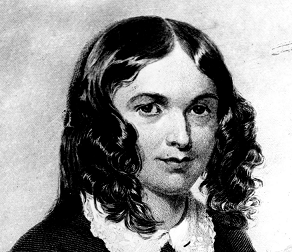
|
|
I don't have anything, since I don't have you

Since I Don't Have You
|
I don't have plans and schemes
I don't have hopes and dreams
I don't have anything
since I don't have you
I don't have fond desires
I don't have happy hours
I don't have anything
since I don't have you...
|
READ MORE
|
|
'nothing was of any value without him'
Anne Of Green Gables, Lucy Maud Montgomery (1985)
“Oh, the black years of emptiness stretching before her!”
|
"There is a book of Revelation in every one's life, as there is in the Bible… She loved Gilbert -- had always loved him! She knew that now. She knew that she could no more cast him out of her life without agony than she could have cut off her right hand and cast it from her… If she had not been so blind -- so foolish -- she would have had the right to go to him now. But he would never know that she loved him -- he would go away from this life thinking that she did not care. Oh, the black years of emptiness stretching before her! She could not live through them -- she could not! … Nothing was of any value without him. She belonged to him and he to her. In her hour of supreme agony she had no doubt of that… Oh, what a fool she had been not to realize what the bond was that had held her to Gilbert... And now she must pay for her folly as for a crime.”
|
|
one more perspective on how to survive the terror of living forever
On the “Summerland 1-Minute” page I had the pleasure of presenting other-side information asserting that our friends, the animals, also are blessed with living happily forever. Here's a portion of it:
|
"their own eternal life," part two
The following was reported in "Letters From the Spirit World,” channeled information via the mediumship of Carlyle Petersilea who accessed testimony from his father on the other side:

“… within the waters here, glide beautiful fishes — the spirits of those that have died on earth, and it is the same with our animals… nothing is crowded here and there are vast areas of space… When wild animals die on the earth, their spirits rise into great spiritual forests which… human spirits seldom or never visit ... when great sea monsters die, or smaller fish, their spirits ascend and find homes within boundless spiritual oceans. Your globe of earth, that seems so vast to you, is but a small speck, or like a grain of sand, compared to eternity and its eternal heavens… Forms come up through the material, not that they may perish, but that they may be conserved to fill eternity with beauty and intelligence — not only the intelligence of mankind, but the lesser intelligence of beasts, birds, reptiles and fishes — these forms to nature are just as beautiful as is that of man.”

Editor’s note: It strikes me just now that certain ones of us, particularly drawn to the animal kingdom, might choose, while a rare opting, to live among our feathered, furry, and finned brethren on a somewhat permanent basis. No one would stop you.
|
Can you imagine the playful otters undergoing existential crisis? The very idea is absurd. Nothing can interfere with their happiness of whole-heartedly enjoying life and their own existence. And why is that? I think we immediately understand the issue: They have no dysfunctional ego continually unfolding “sad movies in the head.”
They’re not bothered by what happened in the past, nor are they fearful for the future. They simply live their lives before God in an open-hearted and sincere way. The playful otters present to us a living parable of what we need to do in order to enjoy our own eternal life.
|
Editor's last word:
I’ve come to see that the “terror of living forever” is not a separate terror but part of a seamless terror of what the ego experiences every day, all the days of its distorted-vision life.
The ego has many fears, but, fundamentally, only one underlying fear, which is the fear of annihilation. What we experience as ordinary garden-variety terror on a daily basis is the common perception of “I don’t have enough” because “I am not enough.” However, as we peel back the layers of trepidation, it all funnels down to the primary subsuming fear of annihilation, as the “terror of living forever” is just the grand expression of this pervasive disease.
We have discussed that the beauty of one’s Sacred Beloved will “save” us. In her role of “made in the image,” the agent of palpable sense of God’s presence in our minds and hearts, she offers a vivifying and strengthening effect, able to overcome the ego’s fear of annihilation.
But what does this mean? It is not the bodily beauty – be it mortal body or astral body, formidable as this beauty will likely be - which shall save us. We have learned that nothing external to our own Selves can rescue or help us become more spiritual; and not even one’s Twin Soul, as external being, can help us.
Then what? The answer is - she is more than external being. She is not given the title “Twin Soul” for sport. In some undefined sense, on a deeper level, her very essence merges with, is part of, shares elemental root with, her Beloved. And it is this unseen nexus, which becomes a kind of proxy for one’s own Self, that begins to dismantle the ego's perceptions of terrifying aloneness.
It is not her bodily beauty that saves. But when the radiant visage of the goddess smiles, seemingly affirming and sanctifying one’s very existence, then that warming radiance, as the radiance of God’s own beauty, will calm and soothe the fractured and stressed recipient. Yes, in her smile, the smile of God's agent, we find existential validation and sense of worth. No terror of eternal life can survive within the sacred domain of this enlivening and exhilarating energy.
All this issues as the fulfillment of the ancient “beatific vision” prophecy.

Elenchus. The issue of each Twin revealing the face of God to the other is really something. And it’s helping me to clarify a thought.
Kairissi. Please share – I’m always happy for you to “tell me more about my eyes.”
E. Your reference to the old cartoon is funny. And, of course, your allure, to me, makes you “the most beautiful girl in the world” – I’ve told you that many times. But that’s not what’s really happening with this “revealing the face of God” concept. It’s much more than saying you’d win any beauty contest.
K. (smiling) Feel free to indulge the fantasy, though, as you like.
E. (softly laughing) Well, I could easily do that, but your beauty is more to me than “most beautiful girl.”
K. Which raises the question – how could it be more than that?
E. I’ll try to explain. I’ve seen you, or your photograph, tens of thousands of times. It wasn’t always this way, but, at this stage of my life, when I see your photo, I could almost say that I feel a kind of electric shock. That’s overstating it a little, but when I see you I do feel a kind of surge of energy. And even though this has happened thousands of times, I’m always a little taken aback by this abrupt reaction.
K. Now some would say, that doesn’t sound right. When John chooses Mary, the fireworks can last a while but ever-diminishing after the honeymoon. People accept this falling off of feelings as normal and “just the way it is.”
E. Then they start to talk about “entering a time of more mature married love.”
K. A rationalization which means, the fizz is gone from the soda. Well, we can hardly wait.
E. But I want to point out that this isn’t the way it works if two are connected at the soul level. The fizz doesn’t really leave. It’s always there to draw upon when you want to access it.
K. Like when you look at a certain someone’s photo. So, tell everyone a little more about this subtle “surge of energy.”
E. It’s not biologically based. If a couple’s names are John and Mary, quite a bit of the fever-pitch would be gone pretty soon. But I’ve been monitoring myself with this “energy surge” for many years now, and even though I know it’s coming, when I see your photo I experience a certain sense of “jarring surprise” to see your beauty. It happens every time.
K. mmm...
E. And it’s happened every time for thousands of times in row, and so part me wants to ask, how is this even possible? – surely, one would think, the novelty would begin to wear thin after a while.
K. Wear thin after the honeymoon phase. It’s interesting, John and Mary are surprised at how quickly the pangs of love leave them, but Twins are surprised at the enduring nature of what they feel for each other.
E. This is unknown in the animal kingdom. Why should it persist? Once Mother Nature has what she wants, with biology served, she’s all done and packs her bags. But the “energy surge” known by Twins is not a gift of Mother Nature, but – as we’ve said – issues as a function of Madam Destiny.
K. Yes – destiny. There’s a force in play here that is designed to unite Twins for the eternal marriage.
E. And for eternal life, in general. I have come to see, as I’ve looked at this for so many years now, that what I’m feeling is an energy surge of the soul. It’s not part of “Animal Planet.”
K. This is a phenomenon that no one can believe in – until it’s experienced. It’s so amazing. The face of one’s Twin may indeed be attractive, but what can account for thousands of “energy surges”? How is it possible to be “surprised” tens of thousands of times when the same face is studied? And the answer is, it’s more than your mate’s attractive face captivating you.
E. Again,this will sound unlikely to John and Mary – because it didn’t work this way for them, but – the sense of surprise to see the Sacred Beloved’s face for the fifty-thousandth time, in reality, is to begin to access the awe, wonder, and mystery of the splendor of the “beauty of God.”
K. And this is what will allow Twins to survive “the terror of living forever.” There's an underlying energy that doesn't go away.

K. Elenchus, we should offer a footnote to our discussions – you and I call it “the Father Bruno principle.”
E. That’s important.
K. Why don’t you explain it to everyone.
E. Giordano Bruno was a RCC priest scientist-philosopher burned at the stake in 1600 for heretical views. These included his support for Copernicus’ sun-centered universe; a plethora of worlds in the cosmos containing intelligent life; the destructiveness of religion as means to control uneducated people; that Christ was an evolved man and not God; and other non-orthodox positions.
K. This is really something. He was killed during the time of Galileo, not long before the coming of Newton. Here we have the world climbing out of its superstitious abyss with the beginnings of modern science and the RCC is killing those leading the advance of enlightenment.
E. It’s breath-taking to perceive his grasp of reality, essentially, the intellectual precepts that many come to see as they progress.
K. Explain what we mean by “the Father Bruno principle.”
E. Historian Will Durant in his monumental “Story Of Civilization” reports that the testimonies and writings of Father Bruno reveal his confessions of a raging sexual desire. Durant comments: "there is some subtle connection between sexual and intellectual awakening."
K. This is really interesting. You and I have observed this phenomenon, as well. As one grows as a person, as the eyes of the soul open to truth, one’s sexual desire also burgeons and presents itself more intensely.
E. It’s curious and, we would assert, not something generally known.
K. What would you say this means, Elenchus?
E. There’s probably a whole book to be written on this subject, but, in the main, I think it means that the soul is the true center of one’s sexuality – not the material body. Sexual desire is part of one's “made in the image” capacities, and comes alive, more and more, as the soul awakens and matures.
K. It’s strange, isn’t it, Elenchus. If one enters enlightenment later in life, it’s quite possible to find oneself more enflamed with sexual desire at age 71 than at 17.
E. This upends traditional views. The world generally thinks of the latter teens and early adulthood as the time of fiery sexual passion, but it's imagined that one “dries up” with an accumulation of years.
K. And I would say that this general view plays out just this way in many John and Mary relationships. In the beginning, they can’t keep their hands off each other, but, before too long, many of them sleep in separate beds or even separate rooms.
E. The reality, however, the true life of the inner person – if it authentically awakens to itself – is just the opposite.
K. I think of you at 17. You were interested in girls, but you were not sexually active and, I would say, not consumed to express yourself physically.
E. This “71 versus 17” item is another example of how the world’s perceptions of love, marriage, and sex are upside down and backwards.
K. Materialist-fundamentalists project their errant views into how they imagine life will be in heaven. And this is why they believe that there’s no interest in sex over there -- because, in their Earth-marriages, they put sex aside a long time ago.
E. Can we sum up “the Father Bruno principle” for our readers? What would you say, Kriss?
K. Sexual desire is not really a teenage thing. It does not reach full flower with the adventures of “Veronica and Archie.”

Sexual impulse, in its truest sense, reflects our “made in the image” godlike potentialities. As such, it’s something that grows and grows with the awakening of the soul to higher expressions of life and reality.
E. Veronica reminds me of you. She has a certain sharp, fine-featured beauty. I've come to realize that anytime I think another girl looks good, it's because I see your features in her. Veronica isn't smart like you, though - that's how I know the difference.
K. (small smile)

E. As we learned from Greek scholar Dr. Barclay, the “eternal” in “eternal life” essentially means “living life on the level of the gods.”
K. That’s such an important concept.
E. It means that we need a higher level of consciousness to properly fit ourselves for the endless duration of time to come. Simply carrying one’s materialistic thinking into Summerland isn’t going to work for us.
K. Elenchus, I’m reminded of that other Greek word, “arrabon,” the “earnest” of the spirit, which the apostle Paul used. I’d like to encourage our readers to review that article. The precept introduced there helps us to understand how we shall endure eternal life.
E. Explain it to us, Kriss.
K. “Arrabon” is used in I Cor. 5 where it says that “God has prepared us” for eternal life. I take comfort in that. God doesn’t just plop us into a new situation of endless duration of time without “preparing” us. And the “preparing” comes to us in the form of a higher state of consciousness.
E. We might normally think of asking God for "things," but there's no reason that God cannot influence and form our spirits to gravitate toward new perceptions.
K. And that’s what the “earnest of the spirit,” I think, does for us. It moulds and shapes our minds so as to make us ready to inhabit eternity. This means that, if we are open to God’s instruction, we will be led, small step by small step, to enjoy a “preparing” to “live as the gods.”
E. I like that. And it means that we don’t have to worry overmuch concerning the “terror of living forever.” God knows that this is something we require to feel comfortable living with endless duration, “living as the gods,” and so, if we "open a channel" to God's instruction, we can be confident that we will be given what we need at the right time.
K. This is making me smile, Elenchus. After all of our rather extended and sometimes complicated explanations concerning how we will survive eternal life, the simple and best answer is that "God will provide."
E. (smiling) That's our best high-tech answer.
|
Editor's note: See the sister article: How to build a life in Summerland.
Also, the discussion concerning negotiating eternity, especially, on how to make romantic feelings last, continues in a “Wedding Song” writing. See it here.
|







